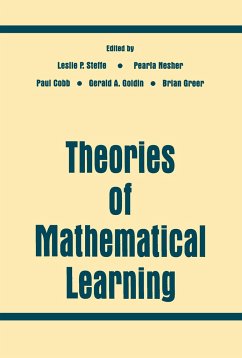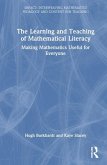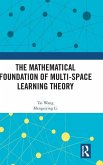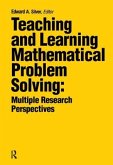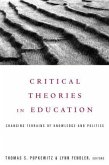Theories of Mathematical Learning
Herausgeber: Steffe, Leslie P.; Cobb, Paul; Nesher, Pearla
Theories of Mathematical Learning
Herausgeber: Steffe, Leslie P.; Cobb, Paul; Nesher, Pearla
- Gebundenes Buch
- Merkliste
- Auf die Merkliste
- Bewerten Bewerten
- Teilen
- Produkt teilen
- Produkterinnerung
- Produkterinnerung
First Published in 1996. Routledge is an imprint of Taylor & Francis, an informa company.
Andere Kunden interessierten sich auch für
![The Routledge International Handbook of Dyscalculia and Mathematical Learning Difficulties The Routledge International Handbook of Dyscalculia and Mathematical Learning Difficulties]() The Routledge International Handbook of Dyscalculia and Mathematical Learning Difficulties289,99 €
The Routledge International Handbook of Dyscalculia and Mathematical Learning Difficulties289,99 €![Learning and Teaching for Mathematical Literacy Learning and Teaching for Mathematical Literacy]() Hugh BurkhardtLearning and Teaching for Mathematical Literacy180,99 €
Hugh BurkhardtLearning and Teaching for Mathematical Literacy180,99 €![The Mathematical Foundation of Multi-Space Learning Theory The Mathematical Foundation of Multi-Space Learning Theory]() Tai WangThe Mathematical Foundation of Multi-Space Learning Theory179,99 €
Tai WangThe Mathematical Foundation of Multi-Space Learning Theory179,99 €![Teaching and Learning Mathematical Problem Solving Teaching and Learning Mathematical Problem Solving]() Teaching and Learning Mathematical Problem Solving171,99 €
Teaching and Learning Mathematical Problem Solving171,99 €![Investigating Mathematics Teaching Investigating Mathematics Teaching]() Barbara JaworskiInvestigating Mathematics Teaching259,99 €
Barbara JaworskiInvestigating Mathematics Teaching259,99 €![Critical Theories in Education Critical Theories in Education]() Lynn Fendler / Thomas Popkewitz (eds.)Critical Theories in Education73,99 €
Lynn Fendler / Thomas Popkewitz (eds.)Critical Theories in Education73,99 €![Mathematical Relationships in Education Mathematical Relationships in Education]() Mathematical Relationships in Education190,99 €
Mathematical Relationships in Education190,99 €-
-
-
First Published in 1996. Routledge is an imprint of Taylor & Francis, an informa company.
Produktdetails
- Produktdetails
- Verlag: Routledge
- Seitenzahl: 538
- Erscheinungstermin: 1. September 1996
- Englisch
- Abmessung: 235mm x 157mm x 33mm
- Gewicht: 921g
- ISBN-13: 9780805816617
- ISBN-10: 0805816615
- Artikelnr.: 40209196
- Herstellerkennzeichnung
- Libri GmbH
- Europaallee 1
- 36244 Bad Hersfeld
- gpsr@libri.de
- Verlag: Routledge
- Seitenzahl: 538
- Erscheinungstermin: 1. September 1996
- Englisch
- Abmessung: 235mm x 157mm x 33mm
- Gewicht: 921g
- ISBN-13: 9780805816617
- ISBN-10: 0805816615
- Artikelnr.: 40209196
- Herstellerkennzeichnung
- Libri GmbH
- Europaallee 1
- 36244 Bad Hersfeld
- gpsr@libri.de
Contents: Preface. Part I: P. Cobb
Sociological and Anthropological Perspectives on Mathematics Learning.P. Cobb
B. Jaworski
N. Presmeg
Emergent and Sociocultural Views of Mathematical Activity. J. Voigt
Negotiation of Mathematical Meaning in Classroom Processes: Social Interaction and Learning Mathematics. G.B. Saxe
T. Bermudez
Emergent Mathematical Environments in Children's Games. J. Richards
Negotiating the Negotiation of Meaning: Comments on Voigt (1992) and Saxe and Bermudez (1992). A.D. Schliemann
D.W. Carraher
Negotiationg Mathematical Meanings In and Out of School. E. Yackel
Social Interaction and Individual Cognition. B. van Oers
Learning Mathematics as a Meaningful Activity. E.A. Forman
Learning Mathematics as Participation in Classroom Practice: Implications of Sociocultural Theory for Educational Reform. K. Crawford
Cultural Processes and Learning: Expectations
Actions
and Outcomes. J.W. Stigler
C. Fernandez
M. Yoshida
Traditions of School Mathematics in Japanese and American Elementary Classrooms. Part II: B. Greer
Cognitive Science Theories and Their Contributions to the Learning of Mathematics.B. Greer
Theories of Mathematics Education: The Role of Cognitive Analyses. G. Hatano
A Conception of Knowledge Acquisition and Its Implications for Mathematics Education. G. Vergnaud
The Theory of Conceptual Fields. D.W. Carraher
Learning About Fractions. P.W. Thompson
Imagery and the Development of Mathematical Reasoning. R.B. Davis
Cognition
Mathematics
and Education. Part III: G.A. Goldin
The Contribution of Constructivism to the Learning of Mathematics.G.A. Goldin
Theory of Mathematics Education: The Contributions of Constructivism. E. von Glasersfeld
Aspects of Radical Constructivism and Its Educational Recommendations. F. Marton
D. Neuman
Phenomenography and Children's Experience of Division. P. Ernest
Varieties of Constructivism: A Framework for Comparison. N. Herscovics
The Construction of Conceptual Schemes in Mathematics. G. Booker
Constructing Mathematical Conventions Formed by the Abstraction and Generalization of Earlier Ideas: The Development of Initial Fraction Ideas. G.A. Goldin
J.J. Kaput
A Joint Perspective on the Idea of Representation in Learning and Doing Mathematics. C.A. Maher
A.M. Martino
Young Children Invent Methods of Proof: The Gang of Four. C. Janvier
Constructivism and Its Consequences for Training Teachers. Part IV: Perspectives on the Nature of Mathematical Learning.W. Dörfler
Is the Metaphor of Mental Object Appropriate for a Theory of Learning Mathematics? L.P. Steffe
H.G. Wiegel
On the Nature of a Model of Mathematical Learning.
Sociological and Anthropological Perspectives on Mathematics Learning.P. Cobb
B. Jaworski
N. Presmeg
Emergent and Sociocultural Views of Mathematical Activity. J. Voigt
Negotiation of Mathematical Meaning in Classroom Processes: Social Interaction and Learning Mathematics. G.B. Saxe
T. Bermudez
Emergent Mathematical Environments in Children's Games. J. Richards
Negotiating the Negotiation of Meaning: Comments on Voigt (1992) and Saxe and Bermudez (1992). A.D. Schliemann
D.W. Carraher
Negotiationg Mathematical Meanings In and Out of School. E. Yackel
Social Interaction and Individual Cognition. B. van Oers
Learning Mathematics as a Meaningful Activity. E.A. Forman
Learning Mathematics as Participation in Classroom Practice: Implications of Sociocultural Theory for Educational Reform. K. Crawford
Cultural Processes and Learning: Expectations
Actions
and Outcomes. J.W. Stigler
C. Fernandez
M. Yoshida
Traditions of School Mathematics in Japanese and American Elementary Classrooms. Part II: B. Greer
Cognitive Science Theories and Their Contributions to the Learning of Mathematics.B. Greer
Theories of Mathematics Education: The Role of Cognitive Analyses. G. Hatano
A Conception of Knowledge Acquisition and Its Implications for Mathematics Education. G. Vergnaud
The Theory of Conceptual Fields. D.W. Carraher
Learning About Fractions. P.W. Thompson
Imagery and the Development of Mathematical Reasoning. R.B. Davis
Cognition
Mathematics
and Education. Part III: G.A. Goldin
The Contribution of Constructivism to the Learning of Mathematics.G.A. Goldin
Theory of Mathematics Education: The Contributions of Constructivism. E. von Glasersfeld
Aspects of Radical Constructivism and Its Educational Recommendations. F. Marton
D. Neuman
Phenomenography and Children's Experience of Division. P. Ernest
Varieties of Constructivism: A Framework for Comparison. N. Herscovics
The Construction of Conceptual Schemes in Mathematics. G. Booker
Constructing Mathematical Conventions Formed by the Abstraction and Generalization of Earlier Ideas: The Development of Initial Fraction Ideas. G.A. Goldin
J.J. Kaput
A Joint Perspective on the Idea of Representation in Learning and Doing Mathematics. C.A. Maher
A.M. Martino
Young Children Invent Methods of Proof: The Gang of Four. C. Janvier
Constructivism and Its Consequences for Training Teachers. Part IV: Perspectives on the Nature of Mathematical Learning.W. Dörfler
Is the Metaphor of Mental Object Appropriate for a Theory of Learning Mathematics? L.P. Steffe
H.G. Wiegel
On the Nature of a Model of Mathematical Learning.
Contents: Preface. Part I: P. Cobb
Sociological and Anthropological Perspectives on Mathematics Learning.P. Cobb
B. Jaworski
N. Presmeg
Emergent and Sociocultural Views of Mathematical Activity. J. Voigt
Negotiation of Mathematical Meaning in Classroom Processes: Social Interaction and Learning Mathematics. G.B. Saxe
T. Bermudez
Emergent Mathematical Environments in Children's Games. J. Richards
Negotiating the Negotiation of Meaning: Comments on Voigt (1992) and Saxe and Bermudez (1992). A.D. Schliemann
D.W. Carraher
Negotiationg Mathematical Meanings In and Out of School. E. Yackel
Social Interaction and Individual Cognition. B. van Oers
Learning Mathematics as a Meaningful Activity. E.A. Forman
Learning Mathematics as Participation in Classroom Practice: Implications of Sociocultural Theory for Educational Reform. K. Crawford
Cultural Processes and Learning: Expectations
Actions
and Outcomes. J.W. Stigler
C. Fernandez
M. Yoshida
Traditions of School Mathematics in Japanese and American Elementary Classrooms. Part II: B. Greer
Cognitive Science Theories and Their Contributions to the Learning of Mathematics.B. Greer
Theories of Mathematics Education: The Role of Cognitive Analyses. G. Hatano
A Conception of Knowledge Acquisition and Its Implications for Mathematics Education. G. Vergnaud
The Theory of Conceptual Fields. D.W. Carraher
Learning About Fractions. P.W. Thompson
Imagery and the Development of Mathematical Reasoning. R.B. Davis
Cognition
Mathematics
and Education. Part III: G.A. Goldin
The Contribution of Constructivism to the Learning of Mathematics.G.A. Goldin
Theory of Mathematics Education: The Contributions of Constructivism. E. von Glasersfeld
Aspects of Radical Constructivism and Its Educational Recommendations. F. Marton
D. Neuman
Phenomenography and Children's Experience of Division. P. Ernest
Varieties of Constructivism: A Framework for Comparison. N. Herscovics
The Construction of Conceptual Schemes in Mathematics. G. Booker
Constructing Mathematical Conventions Formed by the Abstraction and Generalization of Earlier Ideas: The Development of Initial Fraction Ideas. G.A. Goldin
J.J. Kaput
A Joint Perspective on the Idea of Representation in Learning and Doing Mathematics. C.A. Maher
A.M. Martino
Young Children Invent Methods of Proof: The Gang of Four. C. Janvier
Constructivism and Its Consequences for Training Teachers. Part IV: Perspectives on the Nature of Mathematical Learning.W. Dörfler
Is the Metaphor of Mental Object Appropriate for a Theory of Learning Mathematics? L.P. Steffe
H.G. Wiegel
On the Nature of a Model of Mathematical Learning.
Sociological and Anthropological Perspectives on Mathematics Learning.P. Cobb
B. Jaworski
N. Presmeg
Emergent and Sociocultural Views of Mathematical Activity. J. Voigt
Negotiation of Mathematical Meaning in Classroom Processes: Social Interaction and Learning Mathematics. G.B. Saxe
T. Bermudez
Emergent Mathematical Environments in Children's Games. J. Richards
Negotiating the Negotiation of Meaning: Comments on Voigt (1992) and Saxe and Bermudez (1992). A.D. Schliemann
D.W. Carraher
Negotiationg Mathematical Meanings In and Out of School. E. Yackel
Social Interaction and Individual Cognition. B. van Oers
Learning Mathematics as a Meaningful Activity. E.A. Forman
Learning Mathematics as Participation in Classroom Practice: Implications of Sociocultural Theory for Educational Reform. K. Crawford
Cultural Processes and Learning: Expectations
Actions
and Outcomes. J.W. Stigler
C. Fernandez
M. Yoshida
Traditions of School Mathematics in Japanese and American Elementary Classrooms. Part II: B. Greer
Cognitive Science Theories and Their Contributions to the Learning of Mathematics.B. Greer
Theories of Mathematics Education: The Role of Cognitive Analyses. G. Hatano
A Conception of Knowledge Acquisition and Its Implications for Mathematics Education. G. Vergnaud
The Theory of Conceptual Fields. D.W. Carraher
Learning About Fractions. P.W. Thompson
Imagery and the Development of Mathematical Reasoning. R.B. Davis
Cognition
Mathematics
and Education. Part III: G.A. Goldin
The Contribution of Constructivism to the Learning of Mathematics.G.A. Goldin
Theory of Mathematics Education: The Contributions of Constructivism. E. von Glasersfeld
Aspects of Radical Constructivism and Its Educational Recommendations. F. Marton
D. Neuman
Phenomenography and Children's Experience of Division. P. Ernest
Varieties of Constructivism: A Framework for Comparison. N. Herscovics
The Construction of Conceptual Schemes in Mathematics. G. Booker
Constructing Mathematical Conventions Formed by the Abstraction and Generalization of Earlier Ideas: The Development of Initial Fraction Ideas. G.A. Goldin
J.J. Kaput
A Joint Perspective on the Idea of Representation in Learning and Doing Mathematics. C.A. Maher
A.M. Martino
Young Children Invent Methods of Proof: The Gang of Four. C. Janvier
Constructivism and Its Consequences for Training Teachers. Part IV: Perspectives on the Nature of Mathematical Learning.W. Dörfler
Is the Metaphor of Mental Object Appropriate for a Theory of Learning Mathematics? L.P. Steffe
H.G. Wiegel
On the Nature of a Model of Mathematical Learning.

